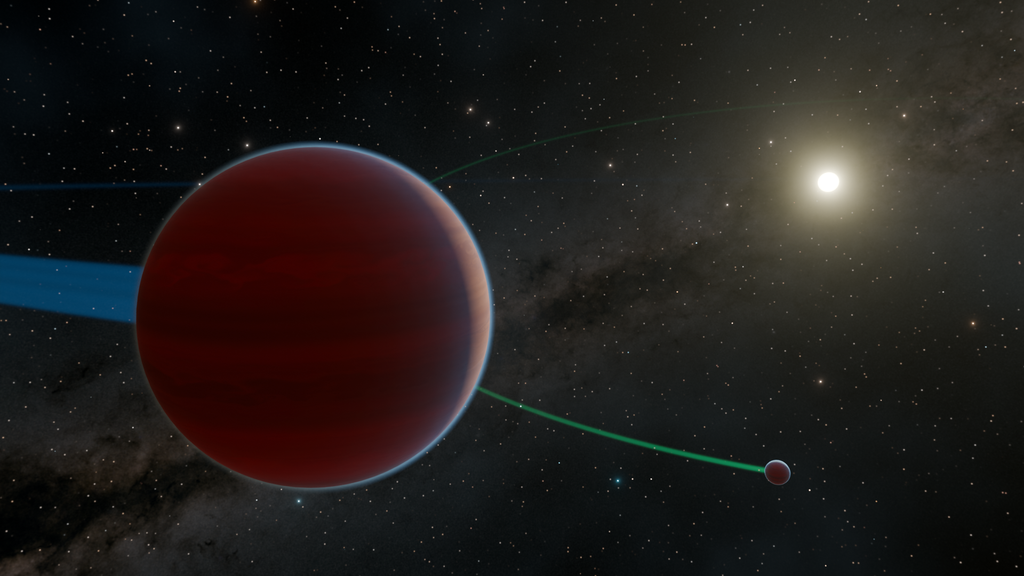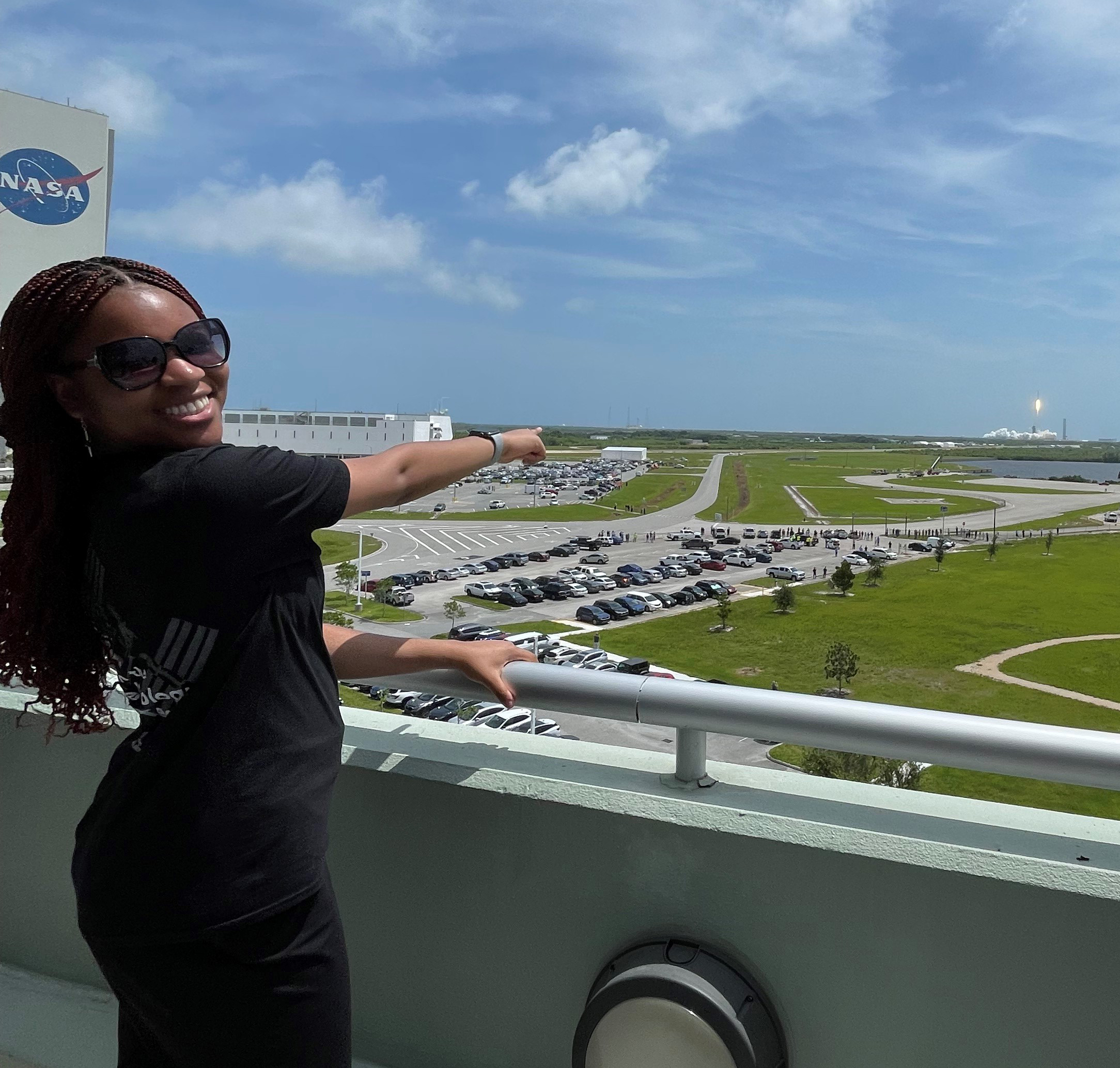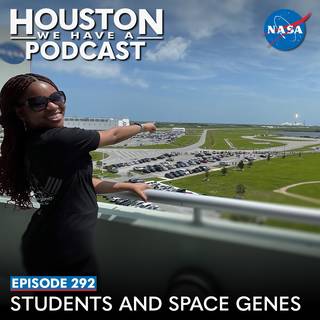
From Earth orbit to the Moon and Mars, explore the world of human spaceflight with NASA each week on the official podcast of the Johnson Space Center in Houston, Texas. Listen to in-depth conversations with the astronauts, scientists and engineers who make it possible.
On episode 292, the co-founder of the “Genes in Space” program joins the 2022 student winner to discuss this competition that allows students across the country to design an experiment for the International Space Station. This episode was recorded on May 17, 2023.
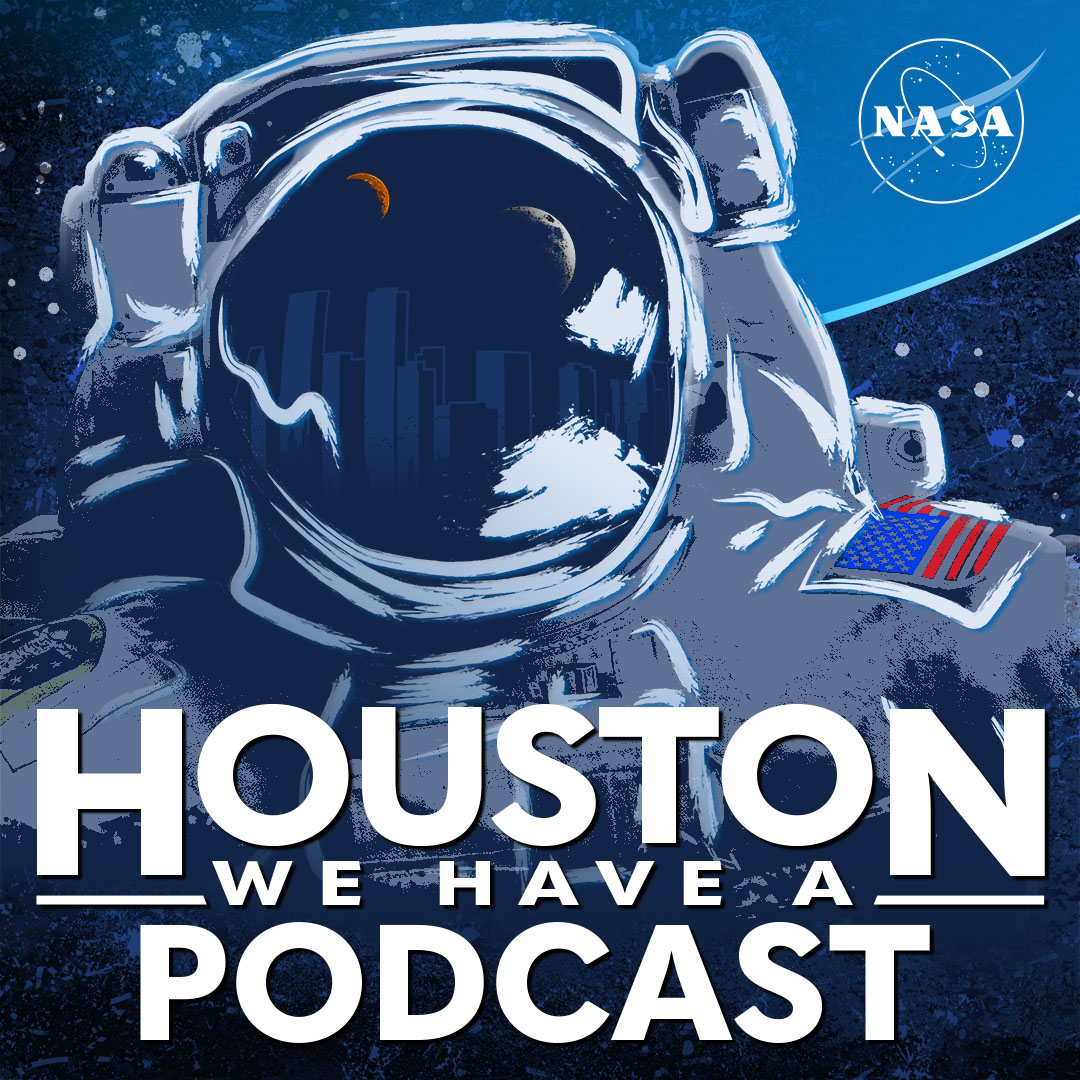
Transcript
Gary Jordan (Host): Houston, we have a podcast! Welcome to the official podcast of the NASA Johnson Space Center, Episode 292, “Students and Space Genes.” I’m Gary Jordan. I’ll be your host today. On this podcast, we bring in the experts, scientist, engineers, astronauts, students, all to let you know what’s going on in the world of human spaceflight and more. We’re lucky to get to chat with scientists, engineers, and students on the podcast to demonstrate the widespread opportunities that the International Space Station offers. What’s become increasingly clear to me is that there are so many ways for students to get involved in space that inspire potential career paths, particularly in engineering and science. One such opportunity is a program called Genes in Space running every year since 2015. This program collects proposals from middle and high school students who design an experiment to run aboard the International Space Station. Whoever wins gets to see their experiment fly to space and run by astronauts. Now this competition calls out to students interested in science, focusing on DNA (deoxyribonucleic acid), genes in space, gives students a taste of what life would be like as part of the large scientific community that contributes to research on the International Space Station, and often inspires these students to pursue a career in these fields. We’re lucky to have join us today Scott Copeland, co-founder of the Genes in Space Program at Boeing and Pristine Onuoha, the student winner of the Genes in Space 2022 competition. No sweatpants today. We’re dressing up for genes in space…
[crickets]
Host: [awkward cough] Sorry.
[Music]
Host: Scott and Pristine, thanks so much for coming on Houston We Have a Podcast today.
Scott Copeland: Thank you very much for having us here today. We’re, we’re excited to participate.
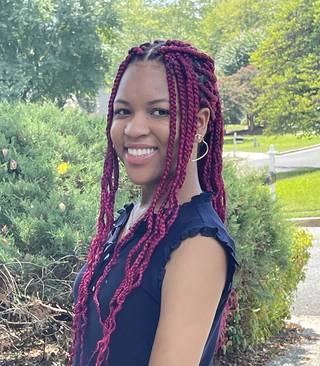
Pristine Onuoha: Yeah, thanks for having us. I’m really excited.
Host: Yeah, happy to have you both. This is really cool. I get to talk with the co-founder of Genes in Space and talk about the whole thing, and then of course, a winner, getting multiple perspectives here. This is very, very interesting. I want to dive into a little bit about each of you before we get into genes in space and, and what this is, and really the whole experience of, of what, what you guys saw for 2022 and what we will see for 2023. Scott, why don’t we start with you? You were a co-founder of Genes in Space, but it’s one of many hats that you wear.
Scott Copeland: That’s correct. Yeah. I’m very fortunate to get the role of being the project manager for Genes in Space. Overall, we have a, a wonderful co-founder also with our company in Boston, miniPCR bio. And they run the day-to-day execution of the, the contest itself. So Boeing’s role and what my role is primarily is looking at, we’re responsible for the flight integration, the safety certification, and the on orbit operations of that. But we work hand in hand throughout the, the entire process for the contest. During the day, my normal job, I’m the director for research integration for all the payloads that get flown up to the space station. So, NASA OZ (Utilization office) is my immediate customer…
Host: All right.
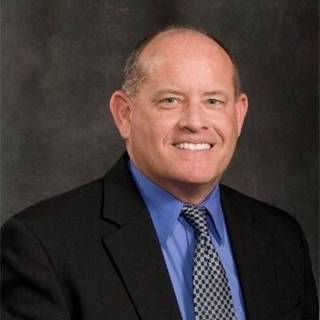
Scott Copeland:…for that activity. So very happy to do that. And then I get to do the Genes in Space as a side job and that’s actually, probably the most favorite thing I get to do. So it’s a lot of fun to interact with the students and such.
Host: That’s great. Yeah. And we’ll definitely get into why it’s so, it’s such a, it’s such a wonderful thing to do. And I’ve got to experience it myself over in San Francisco one year and got to see the excitement from the students. So I definitely understand. It’s just this, that personal, when you see it in their eyes, the excitement, there’s nothing else like it.
Scott Copeland: That’s correct. Yeah. My background is actually mechanical engineering from Auburn University.
Host: Oh, cool.
Scott Copeland: But I’ve always had an interest in the other sciences as well. I grew up my 1-12. My school was on campus of university there in East Tennessee. And so, my, my father was chairman of the biology department there. My mother worked on campus as well in the business office. My sister’s a medical doctor. She teaches and is a professor of internal medicine at the medical school there. So I’ve been surrounded with the life sciences all my life.
Host: Wow.
Scott Copeland: And so, I think the, that’s kind of made a positive influence on mine and my desire to, to work with the STEM (science, technology, engineering, and mathematics) outreach, which is so important to Boeing.
Host: Wow. That’s incredible because you get to do a little bit of that, but then you also get to explore all the different sciences in your research integration role. That’s what that is, is bringing a huge variety of science to the International Space Station. So you get to see a little bit of everything.
Scott Copeland: Yeah. From all the disciplines. So it’s quite exciting.
Host: [Laughter] And quite busy, right?
Scott Copeland: That’s correct.
Host: Yeah, we’re in a period of, in, of, in a lot of use for the International Space Station. We can get into that, too. Pristine, welcome to the podcast. Glad to have you. Tell me about, you know, your education so far and your introduction to Genes in Space and how, how you got where you are today?
Pristine Onuoha: Yeah, so, I guess I can talk about how I learned about Genes in Space. I learned about it through my, through my high school, through a STEM club there. It’s called, The Women in STEM club. And it was just an opportunity offered to different students and I was really drawn to the opportunity because throughout my life, I’ve always been really curious about the world and specifically about biology. I loved asking questions about how life works and that kind of led me to research because I really liked the process of asking questions as well as like pursuing the answers to those questions. So when I saw the Genes in Space opportunity, I saw it as an opportunity for me to just explore my biology passions further.
Host: That’s awesome. Did you, did you always have that sort of curiosity? Is that something maybe your parent, do your parents have some history in, in science or is it something you just sort of stumbled upon?
Pristine Onuoha: I guess I got introduced to it by my parents. My parents are both in medicine, so they had that human health aspect and experience. And so, I guess learning from them and then trying to dive deeper into it throughout my life and through various experiences, my education, it kind of just helped steer me towards that route.
Host: That’s awesome. And so, you’re still in high school, right? And you’re going to be going to college next year, right?
Pristine Onuoha: Yes.
Host: Do you have any idea what you want to do, where you want to go?
Pristine Onuoha: Yeah, so I’m planning on heading to UNC Chapel Hill in the fall. And I’m planning on majoring either biology or biochemistry. Just a major that will help me really get more involved in biological research in the future.
Host: Yeah, you want that element of life, it seems. Of all the different sciences, the, the biology, the biological aspect, the life aspect is something that’s most intriguing to you?
Pristine Onuoha: Yes.
Host: And why is that? Of all the different things, you could have done physics, you could have done engineering. Why, why, why biology?
Pristine Onuoha: I, it’s just really interesting to learn about like the microscopic processes within living things. Like, looking at a organism from a whole, it seems to be simple, but then you learn about the different cells, the cellular processes, everything that integrates and works together to keep an organism alive. And then, also learning about different ways that things can go wrong; things can change and thinking of how you can use innovation to improve human health or just like improve cellular processes and apply it in a way that’s beneficial.
Host: That’s awesome. Did you have a, did you have a, a really good biology teacher, because you see, the thing is like, I was really interested in biology, but just didn’t have a teacher that really inspired me. And so, I didn’t really get sucked in, even though I was, I remember going into biology class, very interested in biology, but then walking away feeling defeated and, you know, I just, I just didn’t feel like it was something that I could do. Did you have a good biology teacher, good mentor that sort of encouraged you to keep pursuing something like that?
Pristine Onuoha: Absolutely. My AP biology teacher from last year was really a great mentor to me and she’s actually my sponsor for Genes in Space, like throughout her class…
Host: Cool.
Pristine Onuoha:…I was just always really engaged with the material, and she noticed that, and she would always offer me different opportunities to get involved with like, “oh, there’s a STEM internship that you could apply to” or “here’s a local program you can get involved with.” And she really just helped me nurture my passion for biology. And so, when I wrote my proposal for Genes in Spaces and submitted it, she was the first person I thought of, of being my sponsor.
Host: That is awesome. That’s awesome. So let’s talk about Genes in Space, right? Scott, we’ll go over to you. What is Genes in Space? Tell us about the history? Tell us about what it is, what is this program?
Scott Copeland: OK. A little bit of history. So Boeing is continuously looking for businesses that can take advantage of the unique environment in space, right? So everything works a little different there. There’s a lot that can be discovered for flying experiments in that environment. So we met our co-founders, the miniPCR bio in Boston in 2014. So they had a small device that was made for like a copy machine of replicating DNA. And we knew there was a gap on station. We had no capability really at that time to do any molecular biology type experiments. And that was primarily due to the, the, the standard equipment at that time, was heavy, bulky, very cumbersome, was not very conducive to put onto the space station. Their little device was compact, it used low power. It was perfect. So it was a solution we’d been looking for. So we started discussions with them and that was kind of how Genes in Space was born. So we went ahead and bought two of the machines. We went ahead and got them qualified, but then the big question was, what are we going to do with it?
Host: Yes.
Scott Copeland: And so, all this happened over about a six-week period. We started some discussions with the, the, with the owners of the company. And they had grown up in Argentina and in that country, they had no access to really technical-type equipment in their high schools. And so, they really had a passion for STEM education, putting inexpensive equipment into the classrooms with the training materials that would go along with it. So at that point, we decided, why don’t we merge our experience with aerospace and flying payloads with their background in the STEM education and the technology of DNA replication. Let’s throw the question out to what to do with it to the students. So that’s how it came about, because that’s a very wide-open question, right? Open-ended, and so, we decided to let the students decide what to do with it. So that was the genesis of it. Our first contest was, took place in 2015. So we opened it, I think in mid-January with submissions required by April. So it was really a fast-paced project that first year.
Host: Yeah. My goodness. How did, how did, how did that first year go? When you opened it up, there’s this brand new thing, no one’s, this is year number one. How many, did you get a lot of submissions, a lot of engagement?
Scott Copeland: We did. We, we were very pleased, we were running to the cliff, you know?
Host: I bet.
Scott Copeland: And we had no budget. We were pretty much doing all this on our own time; after work and such. But worked out very well. We ended up with over 300 submissions and the first winner was, Anna-Sophia Boguraev, and she actually has a journal article that was published in nature on the first preliminary chain reaction. Now, that’s a common term after the COVID, right?
Host: Yeah.
Scott Copeland: So we did the first PCR (Polymerase Chain Reaction) demonstrated it would actually work in space. No one had ever done that before.
Host: Incredible. Incredible. My gosh. So let’s, let’s talk about, I want to keep talking about Genes in Space and just the whole process, right? So you sort of, you, you really breeze through the process of just collecting proposals, reviewing them, and then, and then somehow, there’s this thing about, there’s a moment where the proposal turns into a thing that actually flies on station, right? So when you’re actually, when you actually go through the process, what does that look like step-by-step?
Scott Copeland: OK. So the Genes in Space contest itself is open for students in grade 7-12. And so, it’s a, a fairly short proposal they submit, and we collect those on a website. And so, once all those are in, we started off the first year around 300. I think the maximum we’ve ever had is close to 900 or so in a given year. So we collect the proposals, we have a great team of mentors from Harvard and MIT (Massachusetts Institute of Technology). They donate their time, they’re taken away from their research to help us, but they screen the proposals with us. We just finished this year’s screening about a week ago in Boston. So they go through those, we down select those, and then, it’s a real wonderful experience to watch the debates that go on. So you can cut about half out pretty fast, but the, then you’re getting down to where there’s a lot of different unique experiments being proposed from the students.
Host: Yeah.
Scott Copeland: They’re very creative in, in what they come up with. It’s a lot of fun to watch that debate go on. Each proposal is reviewed by at least two independent reviewers. And then, over a course of several weeks, we come down to about 75 proposals at that point. And then, all those are reviewed again and by different reviewers. And eventually, we come up with our semi-finalists. And so, that’s about 30, 30 semi-finalists at that point.
Host: And they’re the ones that actually, from there, they’re the ones that actually have to present.
Scott Copeland: Well at that point, what we asked them to do is based on two things. One is their written proposal they turned in and then we ask them all to do a short 60-second video. So we want to look at their communication skills and how they can present their proposal. And so, from that, we down select to our top five.
Host: OK. And then, and then it really picks up with the…
Scott Copeland: Correct.
Host:…level of complexity that they have to deliver.
Scott Copeland: Yeah. And what’s great about it is, I think it sets this contest apart from the other science contests I’ve seen. We match each of the five finalist teams with, for two months, they’ll work hand in hand with their mentors from Harvard or MIT. They help them to review their science proposal, they help them with their presentations. We try to mold the, try to stay true to the, what they want to do with their science, but we’ll have to also change it somewhat to make it executable on the space station. So they work with them throughout that process.
Host: Right.
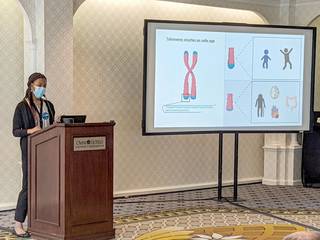
Scott Copeland: Then we bring those five finalists to the ISS Research and Development Conference. This year it’s being held in Seattle, Washington. Stressful for them, I’m sure. So about midway through the conference, they get to present their proposals to a team of experts.
Host: Yeah.
Scott Copeland: And, and then, we make the final selection and announce a winner, winner at the last day of the conference.
Host: Wonderful. Scott, you just laid out the whole process of what it takes to submit a proposal all the way through these step-by-step-by-step, shaving off each proposal and getting, weaning down to the finalists. And it, and it could be quite expansive, right? You said at the high-end it could be like 900 or, or proposals, you said even, even half, you can get right away. That’s still over 400 that you have to really look at and, and, and whittle down even further. Pristine, knowing the back end. Take us through the front end, from the time that you, you know, back to, you already mentioned when you discovered Genes in Space to writing those first proposals and keep and continuing down the path of getting down selected. What was that whole process, that whole experience like for you?
Pristine Onuoha: Yeah, so for me, I didn’t really have like much of an experience with space biology. I didn’t really know much about the field. So one of the first things I did was just try and learn more about it. I remember reading tons and tons of like articles and studies relating to space biology, trying to find like some area of knowledge that hadn’t been like covered. And that specifically led me to the Twin Study. And so that was a NASA study that involved two twins. One twin was sent to space and the other was left on Earth. And so, that study documented the changes between the two. And one of the results that I found really interesting, like dealt with the genetics of the twins in space and it dealt with, that twins telomeres and telomeres are the repetitive DNA that cap the ends of our chromosomes. And so, what I found really interesting was that for the twin in space, it, their telomeres appear to get longer. On Earth, telomeres normally shorten as we age. And because they appear to get longer for the twins in space, it kind of brought up the question of whether astronauts in space age differently? Something I found really interesting about this mystery was that the cause of that process was unknown. And so that was the topic that I really wanted to expand further on. Like it brought up the question for me, how can I design a proposal that will help alleviate this gap in knowledge? And so, I spent a lot of time working on my proposal to design an experiment that would help us see if that process could be linked to a change in the development of certain cells. And so, I just spent a lot of time writing that proposal and I eventually ended up submitting it as my original proposal to the contest. And then later on, I was named a semi-finalist and then later on as a finalist. And so, with my mentor, Ana Karla, she really helped me to take what I had written on paper and put into a format that I could present to a group of people in a really concise and clear way and just get my idea across.
Host: Interesting. So, along the way, you talked about the, the research and the mentorship that, that got you to, to where you are. Can you talk about some of the, some of the, some of the advice that you were given along the way about what it takes to think about things differently in microgravity and, and how to structure a proposal? What advice were you given along the way that helped you to get you to that finalist position?
Pristine Onuoha: Yeah, so my mentor really just helped me try and condense my experiment and make it like as simple as it could be while still trying to answer the question of, how might that, telomere lengthening process happen? And because in space there’s limited resources. And so, I just really worked on trying to design an experiment that would help answer that question.
Host: How, how about your experience in high school? Were you designing experiments and other things and, and kind of had a, a familiarity with how an experiment is designed from, from start to finish? Or was this really your, your deepest, almost introduction into designing an experiment?
Pristine Onuoha: Well, in my high school I had taken like lots of different science classes, and I remember one of my biomedical science classes, we got to design an experiment involving like lactase and enzymes. And so, through experiences like that, I got to have an understanding of the scientific process. And I remember earlier, I did research in aquatic ecology, and so that was more formal. I got to write a whole proposal from beginning to end. And so that really helped give me the experience that I applied to Genes in Space, as I was writing my proposal.
Host: How about when you, when you were getting feedback about how far into the process you were going that, that you were a semi-finalist, that you were a finalist, what were some of those emotions that you were experiencing as you realized like, “oh my gosh, I might actually win this thing?”
Pristine Onuoha: Oh, yeah. It was definitely really exciting. When I was a semi-finalist, that was definitely really exciting. And like Scott said, we were to make a video communicating our idea. And so, looking at what [I] had written on paper, I just spent a lot of time trying to communicate my idea across and not only share the idea but share my excitement for the idea because it was just an idea that I had found really interesting. So I wanted to convey that.
Host: That’s awesome. So, now let’s talk about the Research and Development Conference, right? Scott, you mentioned that this year was, is Seattle. What about 2022? Where did you go?
Scott Copeland: Let’s see, last year…I’m trying to remember.
Host: Washington?
Scott Copeland: Washington, D.C.
Host: D.C. Yes.
Scott Copeland: This is the second time we’d been to Washington D.C. Yeah.
Host: OK. OK.
Scott Copeland: So it went well. And it was so exciting to see when the announcement is made there, I remember Pristine was sitting right down in front of me when we were on the stage, and you could see her just smiling from ear to ear and also just astounded that she had won. [Laughter] It was great. And the, the other students were all very supportive for that as well.
Host: Awesome. Pristine, was it, was it overwhelming? The, the, it’s a, it’s a highly attended conference, right? A lot of people there. And you, you had like a lot of eyes staring at you. What was the experience like for ISS R&D?
Pristine Onuoha: Yeah, so like you said, like the room was enormous and I remember just standing there, before the stage. They were reading out the person who won, and then when it was my name, I was just in shock, like… Yeah. I was in a lot of shock. And I remember hearing the applause of the audience, the applause of the other finalists near me, and then turning and looking to my teacher. She was standing up; she was in tears. And that really just grounded me, like, wow, I won. And then I remember walking up to the stage and getting handed the trophy and the trophy was so heavy, it just really helped bring me back to reality. Like, wow, I actually won, and my experiment will be going up to space. So that was a really memorable experience for me.
Host: That is awesome. Oh my gosh, I, I can’t even imagine. It’s, it’s a cool, it’s a cool experience, this ISS Research and Development Conference, right? You’re, like, this is, you know, if you’re, especially if you’re thinking about joining this community of, of researchers that, that contribute to microgravity science and stuff, you probably had a, a quite a number of experiences to talk with people that are either interested in that and just see how vast that community is. Pristine, did you get to kind of network and talk to different people and learn from, from folks that are experienced in the field? What was, what was that like?
Pristine Onuoha: Yeah, so in the days leading up to my presentation, I remember there being a booth and then, there were just lots of different people involved in space, in space science at different booths. And I remember just walking around and learning about all these cool areas of space biology that I didn’t even know, like were being investigated or studied and just all these technologies being developed for space travel. And I remember specifically going to the table run by the ISS National Lab, and they had all of these opportunities for youth like me to get involved with. And then they just brought me back thinking, wow, I can get more people involved with this. And so, I remember taking a lot of like flyers and just samples. And after the conference, I remember bringing them back to my school and sharing them with my peers so they too, could get involved with this amazing field.
Host: That’s awesome. Scott, this has got to be the reason that of all the places to host the finalists and of all like, of all, of all the ways you could have integrated this experience for students from the proposal to actually, you know, you’re looking at a piece of hardware and really have to design all this whole thing around it and the experience of having finalists at ISS R&D. This has got to be one of the main reasons, right? You have folks that are really passionate about it, that have spent a lot of time. Pristine is, is talking about how much time she spent on all these different elements. Now, now it’s paying off, now it’s paying off with not only the experience of winning, but of talking to really, really passionate people in this field that can help inspire her and others.
Scott Copeland: Yeah, we’re, we’re very happy that we’re able to do the finals at the ISS R&D. They get exposure to; they can go into the main rooms and hear the keynote speakers. They can interface with other companies that are there. There’s a big exhibit hall that Pristine mentioned that they can go visit with all the companies that have equipment on display as well as sitting other splinter sessions and listen to the results of other researchers presenting their results from their on orbit experience.
Host: Doing this year after year, right, starting with 2015, how have you refined the Genes in Space experience and the gene, like the way that it’s structured and all of that, what has changed over time?
Scott Copeland: I think our basic structure has stayed the same. It seems to work pretty well.
Host: Yeah.
Scott Copeland: We did have to pivot significantly during the COVID pandemic…
Host: Of course.
Scott Copeland:…timeframe. But we didn’t miss a beat. We tried to keep the same basic structure there. We couldn’t do anything in person, but the proposal process still stayed the same. The mentoring was done virtual, which is pretty consistent now because our mentors that are probably the real backbone of this contest, they donate their time from Harvard and MIT. So they do their work virtual through FaceTime or, or whatever mechanism works best with students. We have run one international contest, the United Arab Emirates that had its own challenges, but it turned out very well. We learned on that one, it took longer for us to do it instead of a one-year process, it was basically two years, because we didn’t want to lower the standards of what we were looking for because all of these are cutting-edge experiments that we’re used to seeing in the U.S. And it, it took longer to reach the students there and find the, the right candidates for the quality proposals. In the end, it worked out wonderful. Of course, with the international time challenges, it, it made it even more difficult for the mentoring, but it was a good experience all in all.
Host: [Laughter] Now, we talked about the, you know, the proposal and, and the experience of winning and all of that. But ultimately, and Pristine alluded to this, this thing is flying to the International Space Station. So there’s this whole period afterwards, right? You have the 2022 cycle of the proposals and then eventually selecting the winner. We’re now talking in 2023, about 2022 because of this experiment is flying to the International Space Station. So after the, the finalist is selected, Scott, what happens after that to get us to this point, when we’re ready to fly?
Scott Copeland: That’s where the work really begins.
Host: Yes. [Laughter]
Scott Copeland: So we take the, the proposal and the winner, we work with the winner and the mentors and we have to tweak things a little bit on what they want to do and come up with experiment that’s true to, as I said, true to what they, their proposal was about. But we have to be able to execute it. So we’ll go, go through that, but that starts the full integration process. Then we have to get through the safety, get any of the reagents, the chemicals that are being used, get all those through and certified, get those ready to go; write the crew procedures for everything, do our ground testing and validation so that, that’s when it gets really busy for us.
Host: Quite busy. Yeah. And Pristine, what about for you? Was it, what were you doing on your end? Now, that you’re selected, you’re like, “oh my gosh, I actually have to, I have to make this thing fly to the International Space Station?” How were you involved in this process?
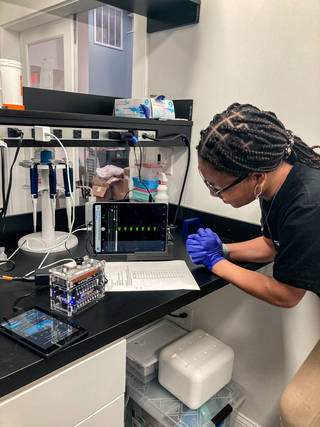
Pristine Onuoha: Yeah, so I met a lot with the Genes in Space team to talk about like the project development process. Yeah, and just like how things are being updated. Some things like, whenever things had to be changed, we just like discussed those. And so, I got to stay pretty involved with the process. And I remember, I was able to go visit the miniPCR headquarters to go and work on like, the pilot data for my experiment. So having that hands-on process, hands-on experience was really great.
Scott Copeland: Yeah, we host, what we call the space biology camp. So at the end of, or towards the end of that process, we bring the student winner back, we meet in Boston at miniPCR and we go through everything top to bottom, so exactly through all the — the procedures, make sure everyone understands exactly what we’re doing. It’s a good experience. And that takes a couple days. This year, I think Pristine, we had some, a Nor’easter come in and the weather got really bad, so we had to compress it to, because they were shutting down the airports. But I think, Pristine probably enjoyed the experience while she was there for the day.
Pristine Onuoha: Yeah.
Host: You did. That’s great. Now, you get the experience of seeing a launch too, right? All this hard work since, you know, you’ve, you’ve designed the proposals, you won, you got to actually, you, you get to actually design an experiment or, or, or work with the team that has this multifaceted approach to getting something to fly to the International Space Station, now you get to go experience it. Will this be your first launch?
Pristine Onuoha: Yes, it’ll be my first launch and so, I’m really, really excited for it. Just like to have the opportunity to see an idea that originally started off in my head, like become a reality and just get launched to the ISS, that’s just so exciting for me. Especially, having a lot of people having supported me throughout the way. It’s just like the culmination of so much hard work and I’m really excited for it.
Host: If only that was the end, right? You could see it just sort of fly up in the distance and that was it. But, but no, you actually have to see this experiment through, right? So you’re going to be working with the miniPCR on, on station and, and seeing your data come in. How involved are you in the, in the process, Pristine of actually running the experiment?
Pristine Onuoha: Yeah, so, I’ve learned how to do the data analysis for the experiment. I learned that at space biology camp. And so, when we get like the data back, we’ll be able to run the analysis on it and just analyze the results and see what we’re getting, and I think they’ll match what we’ve been getting and just help validate the experiment we’re launching.
Host: Now, in terms of that timeframe, right, you have, obviously, you have to, you’re going to graduate high school, you’re going to go on to college, will you still be involved as much as possible in all this throughout, through all that transition?
Pristine Onuoha: Yeah, so I’m, I’m really keen to like get more involved with space biology throughout my career, so I’m definitely planning on staying involved with Genes in Space and the experiment afterwards. We’re planning on hopefully turning into an article, turning the data into an article, so that we can share like our findings with the rest of the scientific community.
Host: Now, you know, this whole process, right, has, has you, you’ve, you’ve shown to me how much your life so far has been dedicated to, to science, to this, even, even to this endeavor. And now, you’re talking about and to college pursuing biology, I think to some extent, right? Maybe, maybe, this, this Genes in Space has inspired you to pursue that or is that something maybe you already wanted to go into? How has, or maybe, here’s a better question. How has Genes in Space in this entire process influenced your direction?
Pristine Onuoha: Yeah, so the Genes in Space experiment experience helped me get more involved with research, really helped walk me through more of the research process and just learning more about the logistics behind, like turning an experiment as ambitious as one getting sent to the ISS to a reality. And so, it really just helped unlock like a passion for space biology for me. So in the future as I’m planning to study biology, I’ll definitely like be focused on that path and that field. So yeah, Genes in Space really helped guide me along that path of space biology.
Host: Yeah. And maybe when you’re in the lab conducting all your different experiments, you’re like, “hey, what if we put this in microgravity?” You’ll always have that in the back of your mind. [Laughter]
Pristine Onuoha: Yeah, yeah. And I think it also has like, specifically steered me more towards genetics because as I was writing a proposal for Genes in Space, I learned so much more about like the field of genetics and just how much we can discover. And so, like you said, applying it to microgravity, we can try to answer questions relevant to space. So, I’m really excited for that.
Host: Scott, this is got to be why this is a sort of a, you said it’s a side job for you, right? I mean, this is, it’s a, it’s a big job. It’s becoming very clear to me because there’s so many, so many steps to this whole thing. There’s the, there’s the proposals, there’s the analyzing the proposals, there’s the, there’s the, the event and selecting a finalist. There’s actually working on the experiment to fly it to station. There’s the whole analyzing those results. There’s so many steps that you have to be involved in and you call this a side job. That’s crazy.
Scott Copeland: Yeah, it’s, it’s really a great experience though. I mean, there’s, so our team is extremely strong. I mean, they have, we all have connections in different fields, so we work very hard to, with the universities and through conferences and industry events to get the word out. So, you know, we, we’ve reached all but six states throughout the, the, since we started Genes in Space, we’ve had proposals from every state, but six. So, we’ll be working to target those states in the near future. It would be great to have a map with all those squares checked off there.
Host: That would be nice. All 50 states have participated and that’s your plan, right? You’re going to keep this going as long as you can.
Scott Copeland: Correct. Yeah, it’s really, it’s, it’s a, a premier STEM education event for Boeing and especially for our space division here. So we’ve had 98-, we’ve reached 9,800 students to date. So that’s fantastic. And with over 5,000 proposals that have come in.
Host: I always find that, you know, the, the, the, the numbers are fantastic. 9,800 students, that’s incredible. I always find the anecdotes for me to be the most powerful, right? So when you hear Pristine’s story, when she comes on and she talks about the whole, you know, being so involved in the process and having, having an influence of everything that’s been put together for Genes in Space to have some influence on, on a person’s career, on a person’s life choices, that to me is always the most powerful thing. And you get to experience that every year.
Scott Copeland: Yeah, it’s, it’s wonderful. Unfortunately, we only have one winner each year, but, but then on the other hand, we do recognize we have the junior scientists awards as well, and so, we recognize another 30 students that participate in that. And, you know, we’re really hoping to train our next generation of employees. You know, that’s part of it, whether they come to Boeing or, or other, but if we can keep the research going in the United States, that’s very important for all of us.
Host: Scott, in your position of working so closely with students, of seeing so many experiments on the International Space Station and of seeing, you know, the scientific community contribute to research in microgravity and see students contribute to microgravity? It, it, in my, from my point of view, it has to be both. And it has to be, they’re, you can take full advantage of the whole microgravity experience by pulling in as much knowledge as possible, particularly from your vantage point, having such deep integration in the whole experience of bringing students, seeing fresh ideas, bringing on the research community. When you look at microgravity research, what’s your, what’s your selling point when you reach out to the, to the, to the researchers? When you reach out to the students, what do you say to try to bring them in as to say, this is why microgravity research is so important?
Scott Copeland: I think it, it’s a such a unique environment that researchers can take advantage of that and find solutions to problems we can’t find here on, in the 1 g environment. So, we’re going to have some huge breakthrough I know coming and I’m looking forward to seeing what that is.
Host: That’s awesome. Pristine, you had the experience of, of Genes in Space, you’re now going to be moving on to a, to a, pursuing a scientific career, and you have students behind you that are going to want to do something very similar. They’re going to want to, they might be interested in science or, or maybe they’re, maybe they’re looking at this whole experience and thinking they have to write a proposal and they have; you know, they’re talking about microgravity research, and it could be, it could be a little bit scary, it could be a little bit daunting. To the students that are going to be following you, Pristine, any words of advice that you can share for a student that may want to do this, but may be too nervous to do it?
Pristine Onuoha: Yeah, I would just tell them to just pursue their curiosity and see how far it takes them. Just like dive deep and don’t be afraid to be ambitious because, and to not be afraid, like, if you don’t know much about the field, because I didn’t have much experience with space biology, but I just pursued my ambitions in it, and it led me here. So…
Host: Were you confident the whole time, Pristine or did you have moments throughout this where, it’s just like, “oh man, I don’t know if I’m ready for this or I don’t know if I can do it,” or, or did you have maybe the right support along the way? What was your experience like?
Pristine Onuoha: Yeah, there were definitely times when I was nervous. I know in the days leading up to my final presentation, there were a lot of nerves, but I knew that I had a lot of people supporting me and like, even if I didn’t win that I still had a great experience, like writing a proposal that I was really excited about and just putting a lot of work into sharing that idea.
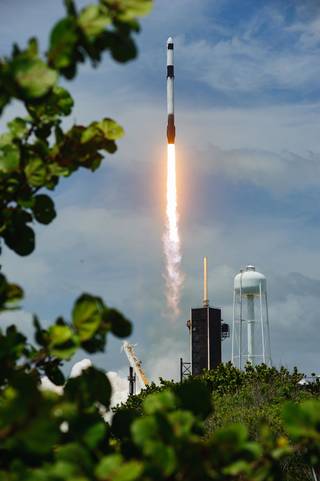
Host: I think that’s important too, right? You don’t necessarily have to be a winner. There’s a lot of people that get to experience this, right? You talked about the 9,200? 9600? Did I, did I get that right? 9,200? There’s a lot of people that get to do this and just that experience alone can be good. It always though, is good Pristine to write down, “Winner 2022” on that resume. That’s, that’s not bad. Very good. Pristine and Scott, thank you so much for coming on Houston We Have a Podcast. This has been such an incredible experience for me to get both of these, your perspective on contributing science and involving students and just the whole round thing that is Genes in Space. Thank you so much for coming on. This is great. And have fun at launch. Florida’s awesome.
Scott Copeland: Yeah, thank you very much. You know, Boeing and miniPCR Bio, we’d like to thank, we have two sponsors that are there with us all the way. New England Biolabs is also in the Boston area. They’ve supported us from the very first year as well as the ISS National Lab, who provides a launch opportunity for us. So without those, we, we could not have this contest be successful. And our mentors are just, I think the, the best in the world that come in to help us and donate their time.
Host: It takes a huge team and it’s definitely good to recognize that. Thank you so much, Scott, and thank to thanks to you Pristine. Enjoy launch.
Pristine Onuoha: Yeah. Thanks so much for having us.
[Music]
Host: Hey, thanks for sticking around. Really good conversation today with Scott and Pristine. I really was inspired about this entire thing, and I hope you learned something today too. You could check out NASA.gov for the latest. There’s a whole section there on Genes in Space, a whole, at least an article that you can go and just sort of review some of the things that they’re doing. And you could check it out in NASA.gov. If you want to check out more of the podcasts we have across the agency, that’s on NASA.gov/podcasts. We are there, Houston We Have a Podcast, and our full episode collection is there, and you can listen to any of them in no particular order. If you want to talk to us on social media, we’re on the Johnson Space Center pages of Facebook, Twitter, and Instagram. And you can use the hashtag #AskNASA on your favorite platform to submit an idea for the show or ask a question, just make sure to mention it’s for us at Houston We have a Podcast. This episode was recorded on May 17th, 2023. Thanks to Will Flato, Pat Ryan, Justin Herring, Heidi Lavelle, Abby Graf, Belinda Pulido, Jaden Jennings, Destiny Doran, Steve Siceloff and Katy Martin. And of course, thanks again to Scott Copeland and Pristine Onuoha for taking the time to come on the show. Give us a rating and feedback on whatever platform you’re listening to us on and tell us what you think of our podcast. We’ll be back next week.














